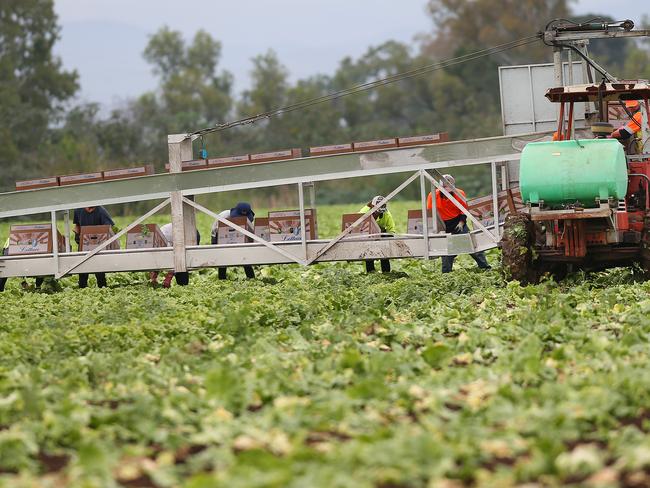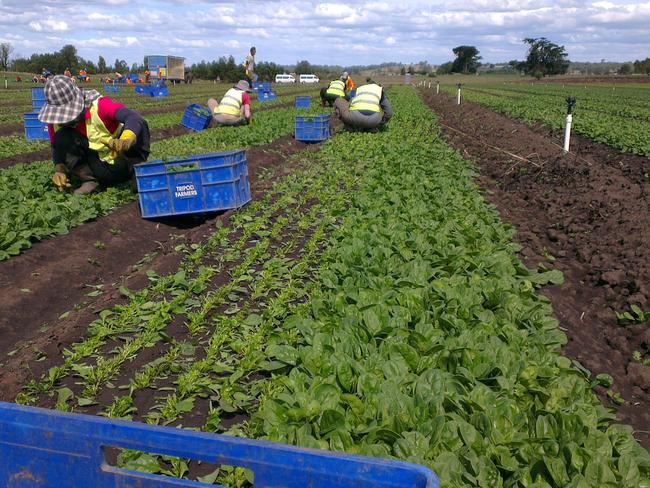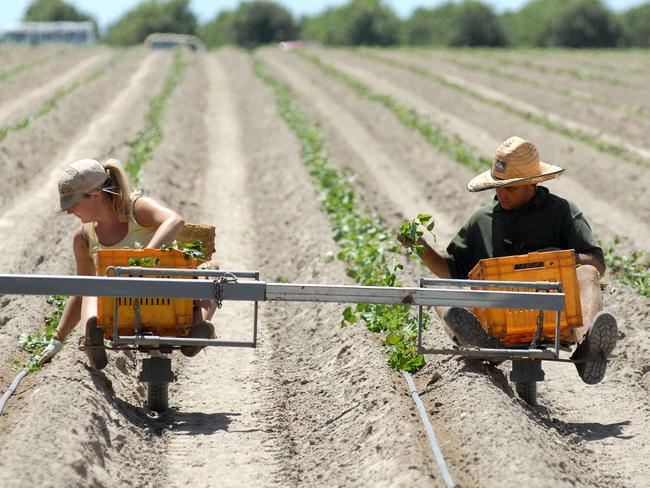‘I wonder how long you’ll last’: Backpacker exploitation goes even deeper
THE latest evidence shows that exploitation of backpackers working in Australia goes even deeper than imagined.
APPALLING revelations this week about the horrific working conditions backpackers endure on Australian farms have sent shockwaves across the country.
Now it appears the exploitation runs much deeper, and insiders are calling for urgent action to prevent unethical employers throwing the industry into disrepute.
Young travellers told news.com.au stories of routine underpayment, mistreatment and even sexual harassment. They say unscrupulous farm and hostel owners are taking advantage of vulnerable people so desperate to complete 88 days of farm work to get a second-year visa that they won’t complain.
Backpackers described backbreaking work at farms around the country, toiling in 40C heat without enough water or proper health and safety training. Some had their passports taken away or employers blackmailing them by refusing to sign off days worked.
The Fair Work Ombudsman on the weekend released the results of a two-year inquiry, which confirmed that workers were often underpaid or not paid at all. Some worked for free in exchange for non-certified accommodation or actually lost money buying tools, accommodation and even the job itself.

Hostels often work with farms as labour hire companies providing backpackers for seasonal work. But many travellers are told to pay in advance for hostels and then placed on long waiting lists for work, their accommodation costs eating into their funds.
Sylviannie Pinon, from Toulouse in France, was told to pay upfront for two weeks’ accommodation in Mildura, Victoria, and was given work picking grapes at a rate of around $1 per bucket.
“I started work at 6.30am and worked until 5.30pm without a break,” she told news.com.au. “We didn’t have access to a kitchen for lunch and were only given a refill of our water bottles once during the day.
“At the end of an 11-hour day spent under 43C, we had to count our buckets. I had 75 full buckets, which should have given me $75 roughly. I asked the owner if he could fill my form for the visa — the proof that I had spent one more day working in rural Australia in order to extend my visa — and he just refused.
“I asked the driver from the backpackers for some help. He said ‘No, we don’t do this.’ So I suspected that the owner of the vineyard probably had no ABN number and it was an illegitimate operation.
“We were told our money would be given to us the following day. When I went to fetch it at the reception of the backpackers, a little envelope was awaiting for me. Inside, $27.
“My $27 equated to $2.45 per hour. And of course, if we remove the price of the journey organised by the backpackers to take us to the vineyard ($10 return) and the price of the scissors to cut the grapes, which I obviously had to purchase myself, there was not much left ... just maybe enough to pay for one night in that cold backpackers ... And because I had paid two weeks in advance, I just felt trapped.

“This was the everyday life of all the backpackers I met. We just stayed there for two weeks, and then left. But during those two weeks a whole industry — farmers and hostels — were making money on our back, and they didn’t seem to mind not having us for very long: there were always other naive and innocent backpackers arriving to be exploited.”
Sylviannie, now living in Richmond, NSW, also worked on an asparagus farm where she was shouted at for not being fast enough. On another stint, she was sent by a Perth work agency to cook and clean at “a great farm” three hours south of the city. The agent said she knew the owner personally and could vouch that he treated staff well.
“He later told me that he didn’t know the lady in the agency and was told not to mention this to me,” said Sylviannie. “So basically she sent a 25-year-old French girl to a remote place with no supermarket or post office at less than 100km away, on her own, without even knowing the owner. This came quite as a shock, as my decision to go was based on a lie, but luckily for me it was a really good farm with respectful people. I can’t think of what would have happened to me if it had been any different.”
The Fair Work report said there were safety concerns “particularly where young workers — especially females with limited English travelling alone — are encouraged through the 417 second-year visa requirements to travel to remote areas.”
Charlene Pickett, a 28-year-old from the UK, told news.com.au the exploitation “runs deeper than just farm work.”

She and her 24-year-old Belgian boyfriend had been looking for work for around a month and were “getting desperate.” They posted an ad on Gumtree and were offered jobs at a small hotel in the tablelands near Cairns — 25 hours a week for $300, plus food, accommodation and overtime.
Her first warning something was wrong came on day one, when other staff members remarked: “I wonder how long you will last.”
Charlene says she was “verbally attacked” and “put down in front of customers” by the owner and her business partner. After they shouted at her in front of a pub full of customers, Charlene asked to speak to her employers, but was told they were too busy.
“We told them we would be leaving,” she said. “We were not in Australia to take those kind of memories home.”
The couple were given $100 each for the week, despite being owed much more, plus overtime. “She said she was deducting money because we were breaking our contract. We argued it out and in the end she gave us $200 and told us the rest would be paid through our tax file number. We left knowing we wouldn’t see the money.
“That part was upsetting enough, but then to find out there was nothing as backpackers we could do to get the remainder of the money was far more frustrating.
“We first went to Fair Work, who told us we were being grossly underpaid but all we could do was report them. They told us there wasn’t anything they could do as they only went after companies that were larger and had been reported several times. We were advised to take them to court.
“After speaking to Fair Work they worked out that we were owed around $700 — which to us at the time was a lot of money — but to get that we had to go back to Cairns, pay all the legal fees and wait until the court date, which just wasn’t possible as we had a flight out of Darwin booked.

“We put up signs in the local campsite to warn people about them but were then threatened with defamation and having our visa revoked.
“We know that this has happened to people before us, who have walked away without getting paid and worse, but there is no way of getting this message to other backpackers, so until someone does something about it they will keep taking advantage.”
More than a third surveyed in the Fair Work Ombudsman’s report said they were paid less than the minimum wage, 14 per cent said they had to pay before getting work and six per cent had to pay an employer to “sign off” on their regional work requirement.
Some were subjected to pay deductions they didn’t agree to in writing as legally required. Most of those surveyed — especially Asian workers — didn’t know their work rights.
The University of New South Wales, the University of Technology Sydney and the University of Sydney have now launched the first large-scale national study into underpayments of temporary visa holders.
Stephen Clibborn of the University of Sydney’s business school said underpayment of an estimated 1.8 million temporary workers in Australia is widespread. “Of those working in low wage, low skill jobs, it would not surprise me if the vast majority have been underpaid at some stage,” he said. “It’s well beyond the well-publicised 7-Eleven.”
It comes a month after the ombudsman alleged a dozen young backpackers were paid an average of $2 an hour to work at a Northern Territory mango business in 2015.
The industry has come under the spotlight after British backpackers Mia Ayliffe-Chung and Tom Jackson were killed at a north Queensland hostel in August.
Ms Ayliffe-Chung’s mother, Rosie Ayliffe, is campaigning to persuade the Australian government to improve conditions for temporary workers like her daughter, who was employed at a sugarcane farm at Home Hill, south of Townsville.

The ombudsman said it was concerned overseas workers seeking regional work to obtain a second-year 417 visa are particularly vulnerable to exploitation by unscrupulous employers who targeted them on social media and websites.
Fair Work Ombudsman Natalie James said the Working Holiday Maker program, designed to facilitate cultural exchange, was in some cases being treated by both visa holders and employers as a “ticket” to work in Australia.
“The desire for a second-year 417 visa can drive vulnerable workers to agree to work for below minimum entitlements and in some circumstances, enter into potentially unsafe situations,” Ms James said.
“The Inquiry findings show that while many 417 visa-holders who work in Australia have a positive experience, many are being subjected to underpayment or non-payment, unlawful deductions, sexual harassment, unsafe working conditions and other forms of exploitation.
“The backpacker labour-force is vital to some industries associated with food production in regional areas but we are at risk of it being a black-market, exploited labour-force if the settings remain the same.”
The report calls for changes to visa rules and laws and making governments and authorities work together to ensure backpackers are protected and aware of their rights.
Mark Glazbrook, Migration Solutions Managing Director, told news.com.au foreign workers being subjected to “horrendous conditions, exploitation and abuse — just because they have a working holiday visa, not a 457.”
His research with the South Australian Centre for Economic Studies highlighted a “significant and unsustainable reliance on backpackers” to fill skill shortages in regional and rural areas.
He claims Australia’s migration program caters for gateway cities but not regional, rural, low population growth or economically challenged jurisdictions.
“I believe that successive Governments have simply turned their backs on this problem,” he added. “There is a very easy solution to the problem of labour shortages in our regional and rural area which feeds this dark industry. Amend the migration program to include a semi-skilled or economic migration program for key industry sectors such as farming, agriculture, aquaculture, horticulture, food manufacturing and production.”
— With wires



